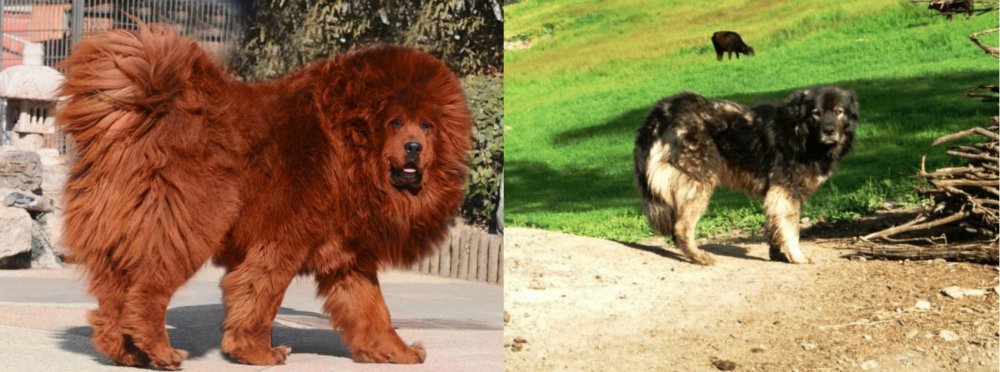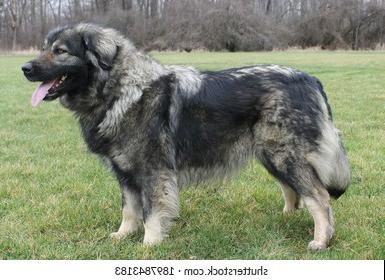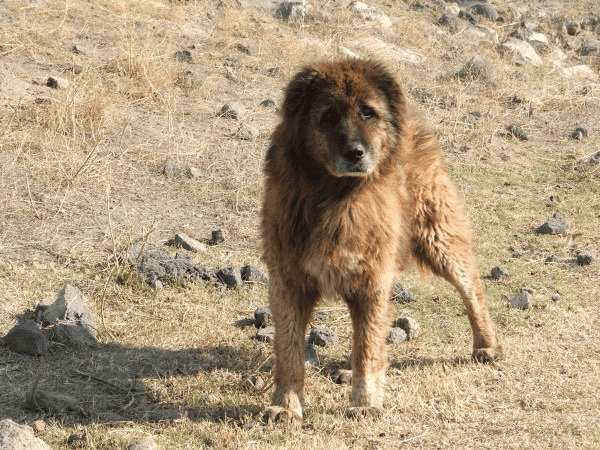- Breed Category: Working Dog
- Country of Origin: Turkey
- Average Height: Males 65-75 cm, Females 60-70 cm
- Average Weight: Males 40-55 kg, Females 35-50 kg
- Average Life Span: 10-12 years
- Grooming Requirements: Moderate, regular brushing needed
- Exercise Requirements: High, needs daily exercise
- Coat Type: Double coat, dense
- Coat Color Variations: White, grey, fawn
- Shedding Level: Moderate to high
- Ear Type: V-shaped, drop ears
- Tail Type: Curled over back
- Temperament: Loyal, protective, independent
- Intelligence Level: High
- Barking Tendency: Moderate
- Compatibility with Children: Good with proper socialisation
- Compatibility with Other Pets: May be wary, needs socialisation
- Training Ease: Moderate, requires experienced handler
- Common Health Issues: Hip dysplasia, bloat
- Dietary Needs: High-quality, balanced diet
- Energy Level: High
- Drooling Tendency: Low
- Sensitivity to Weather: Tolerant to cold, less to heat
- Overall Maintenance Level: Moderate
- Original Purpose: Livestock guardian
- Apartment Friendly: Not ideal, needs space
- Best Suited For: Rural or suburban homes
- Cost of Ownership: Moderate to high
- Unique Traits: Strong guardian instincts
Imagine a dog as resilient as the rugged landscapes of its homeland, yet as loyal as your best mate. Meet the Kars Dog, a breed that stands out with its unique blend of strength and devotion. Originating from the Kars region in Turkey, these dogs have a rich history intertwined with the nomadic lifestyles of ancient shepherds. They were bred to guard livestock against predators, showcasing their protective instincts and unwavering courage. This article aims to delve into the fascinating characteristics, storied history, and essential care tips for the Kars Dog. Whether you’re a seasoned dog owner or just curious, understanding this breed offers a glimpse into a world where tradition and companionship meet.
The Kars Dog: A Glimpse into Its Origins and Role

Early Development of the Breed
The Kars Dog’s journey began in the rugged terrains of Turkey, where it was meticulously developed by local shepherds. These early breeders focused on creating a dog that could withstand harsh climates and protect livestock. The breed’s development was a community effort, with knowledge passed down through generations, ensuring the Kars Dog was perfectly suited to its environment.
Role in Turkish Livestock Farming
In Turkish livestock farming, the Kars Dog plays a crucial role. These dogs are not just pets; they are essential partners in safeguarding herds from predators. Their keen instincts and formidable presence make them invaluable in rural settings, where livestock is a primary livelihood.
Key Historical Figures Involved in the Breed’s Creation
While specific names may not be widely documented, the breed’s creation is attributed to the collective efforts of Turkish shepherds. These individuals, with their deep understanding of the land and its challenges, were instrumental in shaping the Kars Dog into the reliable guardian it is today.
Physical Characteristics
The Kars Dog is a sight to behold, with a robust build and a thick coat that provides protection against the elements. Their strong, muscular frame is complemented by a keen, alert expression, reflecting their readiness to spring into action. These physical traits are not just for show; they are a testament to the breed’s enduring strength and resilience.
Appearance and Unique Physical Traits
The Kars Dog is a striking figure, known for its large size and commanding presence. Its coat is typically a mix of grey, white, and black, with distinctive markings that can vary from dog to dog, adding to its unique charm. The thick, weather-resistant coat is not just for looks; it’s a practical feature that helps them thrive in harsh climates.
Physically, these dogs are built like athletes. Their robust, agile build allows them to move swiftly and with purpose, whether they’re patrolling a farm or playing in the backyard. This combination of strength and agility is what makes them such effective guardians.
Temperament and Behaviour
When it comes to temperament, the Kars Dog is as loyal as they come. They form strong bonds with their families and are known for their protective nature. While they can be reserved with strangers, they are gentle and affectionate with those they trust. Their behaviour is a blend of independence and devotion, making them both reliable and loving companions.
Personality Traits and Suitability

Typical Personality Traits
The Kars Dog is a remarkable blend of loyalty, intelligence, and protectiveness. These dogs are fiercely loyal to their families, often forming deep bonds that make them excellent companions. Their intelligence is evident in their quick learning and problem-solving abilities, which are essential for their role as guardians. Protectiveness is in their nature, making them vigilant watchdogs who are always on the lookout for potential threats.
Suitability as a Family Pet and Working Dog
As a family pet, the Kars Dog is both loving and dependable. They thrive in environments where they can be part of the family, offering companionship and security. Their working dog heritage means they are happiest when they have a job to do, whether it’s guarding livestock or simply keeping an eye on the household. This dual role makes them versatile and valuable additions to any family.
Interaction with Children and Other Animals
With children, the Kars Dog is generally gentle and patient, making them suitable for families with kids. They tend to be protective of younger family members, often watching over them with a careful eye. When it comes to other animals, early socialisation is key. With proper introduction and training, they can coexist peacefully with other pets, although their natural guarding instincts may sometimes come into play.
Training and Exercise Needs
Training a Kars Dog requires consistency and patience. Their intelligence means they pick up commands quickly, but their independent streak can sometimes make them a bit stubborn. Regular training sessions that are engaging and rewarding will yield the best results. Exercise is crucial for this active breed. They need plenty of physical activity to keep them healthy and happy, whether it’s long walks, playtime, or tasks that challenge their minds.
Training, Exercise, and Health of the Kars Dog

Importance of Early Training and Socialisation
Getting a head start on training and socialisation is crucial for the Kars Dog. These dogs are naturally protective, so introducing them to different people, animals, and environments early on helps them grow into well-rounded adults. It’s all about setting the stage for a confident and balanced dog.
Recommended Training Techniques
When it comes to training, consistency is key. Positive reinforcement works wonders with the Kars Dog. They respond well to rewards and praise, making training sessions enjoyable for both you and your dog. Keep sessions short and engaging to hold their interest.
Daily Exercise Requirements and Activities They Enjoy
The Kars Dog is an active breed that thrives on daily exercise. They need a good mix of physical and mental stimulation. Long walks, playtime in a secure yard, and interactive games are all great ways to keep them fit and happy. They also enjoy tasks that challenge their intelligence.
Health and Lifespan
Generally, the Kars Dog is a healthy breed with a lifespan of around 10 to 12 years. Regular vet check-ups, a balanced diet, and plenty of exercise contribute to their well-being. Like all breeds, they can be prone to certain health issues, so staying informed and proactive is important.
Health and Care for the Kars Dog

Common Health Issues
The Kars Dog is generally robust, but like any breed, they can face certain health challenges. Hip dysplasia and joint issues are common, given their size and active nature. Regular vet visits can help catch these early. Eye conditions might also pop up, so keep an eye on any changes in their vision.
Average Lifespan and Health Tips
With proper care, the Kars Dog can live between 10 to 12 years. To keep them healthy, ensure they have a balanced diet rich in nutrients. Regular exercise is a must, not just for their body but for their mind too. Mental stimulation through training and play keeps them sharp and content.
Preventative Care Recommendations
Preventative care is all about being proactive. Regular vet check-ups, vaccinations, and parasite control are essential. Dental care shouldn’t be overlooked either; regular brushing can prevent dental issues down the line.
Grooming and Maintenance
The Kars Dog’s thick coat requires regular grooming to keep it in top condition. Brushing a few times a week helps manage shedding and keeps their coat healthy. Bathing should be occasional, as over-washing can strip their coat of natural oils. Regular nail trims and ear checks are also part of their grooming routine.
Coat Care and Grooming for the Kars Dog

Coat Care and Grooming Routines
The Kars Dog boasts a thick, weather-resistant coat that requires regular attention. Brushing a few times a week is essential to keep their coat free from tangles and to remove loose hair. This not only keeps them looking their best but also helps distribute natural oils, maintaining a healthy shine.
Shedding and Seasonal Grooming Tips
Expect more shedding during seasonal changes, particularly in spring and autumn. During these times, increase brushing frequency to manage the extra hair. A good quality brush designed for thick coats will make the task easier and more effective.
Diet and Nutrition
A balanced diet is crucial for the Kars Dog’s overall health and coat condition. High-quality dog food rich in protein and essential fatty acids supports their active lifestyle and keeps their coat glossy. Always ensure they have access to fresh water, and consider supplements like fish oil for added coat health benefits.
Nutritional Needs and Feeding for the Kars Dog

Nutritional Needs for Optimal Health
The Kars Dog thrives on a diet rich in high-quality protein and essential nutrients. Their active lifestyle demands a balanced intake of proteins, fats, and carbohydrates to maintain energy levels and muscle health. Omega-3 and Omega-6 fatty acids are also important for their coat and skin health.
Foods to Include and Avoid
Include lean meats like chicken, beef, and fish, along with vegetables and whole grains. Avoid foods high in fillers, artificial additives, and excessive fats. Chocolate, onions, and grapes are toxic to dogs and should be strictly avoided.
Feeding Schedules and Portion Recommendations
Feed adult Kars Dogs twice a day, while puppies may need three to four smaller meals. Portion sizes depend on their age, weight, and activity level. Consult your vet for tailored advice, but generally, a balanced diet with controlled portions helps maintain a healthy weight.
Fun Facts and Trivia
Did you know the Kars Dog’s thick coat not only protects them from harsh weather but also helps them blend into their surroundings? This makes them excellent guardians. Their loyalty and intelligence are legendary, often compared to that of ancient warriors.
Interesting Tidbits about the Kars Dog Breed

Famous Kars Dogs in Media or History
The Kars Dog, while not as globally recognised as some other breeds, has its own share of fame. In Turkey, these dogs are celebrated for their role in traditional shepherding, often featured in local folklore and stories. Their reputation as steadfast guardians has made them a symbol of loyalty and bravery in Turkish culture.
In recent years, the Kars Dog has started to gain attention outside of Turkey, thanks to documentaries and social media. These platforms have highlighted their unique abilities and the important role they play in rural communities. Their striking appearance and impressive skills have captivated audiences, sparking interest in this lesser-known breed.
While they may not have starred in blockbuster films or TV shows, the Kars Dog’s real-life heroics in protecting livestock and their families are stories worth telling. Their legacy is built on centuries of dedication and service, making them true stars in their own right.
Final Thoughts
The Kars Dog embodies strength and loyalty in every aspect. As a steadfast guardian, it offers both protection and companionship. This breed’s rich history and unique traits highlight the balance between its rugged resilience and gentle nature. Understanding the Kars Dog’s needs and characteristics can enrich the lives of those who embrace its guardianship. Consider welcoming this remarkable breed into your life, where tradition and loyalty meet.
